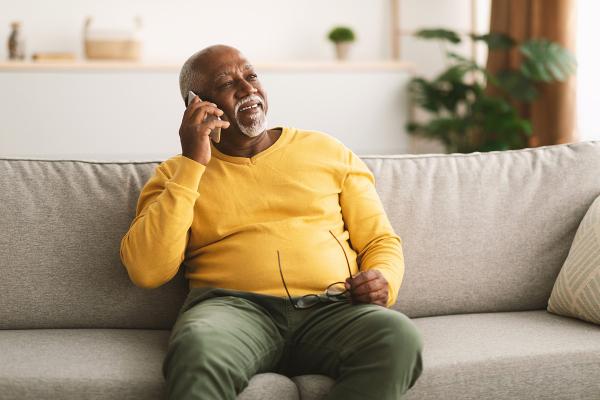
It may be time to get your hearing checked. AARP Hearing Solutions makes it simple. Find a provider today.
One surprising warning sign of hearing loss is fatigue. Here’s why your brain strains to hear — and what to do about it.

There are certain times when it’s natural to feel exhausted. You go on a long hike or play a tough tennis match, for example. Or you stay up to stream a few more episodes of your favorite show.
A sneakier reason people might feel really tired? Hearing problems. There’s even a special name for this type of exhaustion. It’s called “listening fatigue.”1
It happens “when someone has to put extra effort into hearing and understanding sounds, particularly speech, over a prolonged period,” says Ross Cushing, Au.D. He’s a clinical audiologist and CEO of Live Better Hearing + Balance, a family-owned audiology practice.
Roughly 37.5 million American adults have some trouble hearing.2 And age-related hearing loss gets worse as we get older. About a third of adults between 65 to 74 have hearing loss.2
Of course, not everyone with hearing issues will feel exhausted all the time. But you may feel drained after talking to someone, especially if there’s a lot of background noise.
So, it pays to know what listening fatigue is, what the signs are and what to do about it. Read on to learn more.

It may be time to get your hearing checked. AARP Hearing Solutions makes it simple. Find a provider today.
People with hearing loss may feel mentally rather than physically exhausted. That’s because their brain is working overtime.
"Their brain is constantly working to ‘fill in the blank’ of missing words, filter out background noise, and piece together muffled or fragmented sounds,” Cushing says.
To do that, your brain must juggle tasks. For example, it has to tell voices apart from background noise. Or read lips or facial expressions to make sense of the conversation, he notes.
All that may be draining. You may not notice when you’re having a conversation in a quiet place, Cushing explains. But you might feel more tired when there’s a lot of background noise, like at a restaurant or family party.
You can take a preliminary online hearing assessment. While it may not give you official results, it may help you decide whether to get a comprehensive test.
There are several signals to watch out for, says Cushing. They might include:
Listening fatigue may take its toll on your health and well-being in a few ways:
Your brain may not be able to multitask as well: Your brain has to work harder when you’re piecing together what people say. So, you have less brainpower to devote to other tasks, like making decisions or remembering important things.1
You might become isolated: Over time, you may start avoiding social events where you need to listen intently. This could be anything from eating out to watching a football game with friends.
That may lead to social withdrawal, says Cushing. You could start to feel lonely and disconnected from others. It’s also bad for your physical and mental health. Loneliness could raise your chances of:3, 4
The first step? Going to a hearing care professional for a hearing exam and consultation. They may check for signs of hearing loss and confirm if it might be contributing to fatigue, says Cushing. (If you belong to AARP®, you can request a no-cost hearing exam and consultation through AARP® Hearing Solutions™ provided by UnitedHealthcare Hearing.)
If you do have hearing loss, your hearing care professional may suggest you start wearing hearing aids. You’ll likely notice a big difference. Hearing aids typically make interactions with loved ones, coworkers and other people less taxing, says Cushing.
Cushing also recommends these tips to reduce listening fatigue:
Your hearing care professional will map out a treatment plan that works for you. And soon you’ll be back to feeling energized instead of drained when you’re out with friends and family.
Sources
Information is for educational purposes only and is not a substitute for the advice of a licensed medical provider. Consult your provider prior to making changes to your lifestyle or health care routine.
AARP Hearing Solutions is available to all AARP members and does not require a health insurance plan from UnitedHealthcare. The AARP hearing program discount cannot be combined with any other discounts, promotions, coupons or hearing aid benefit plans unless noted herein. Products or services that are reimbursable by federal programs including Medicare and Medicaid are not available on a discounted or complimentary basis. AARP commercial member benefits are provided by third parties, not by AARP or its affiliates. Providers pay a royalty fee to AARP for the use of its intellectual property. These fees are used for the general purposes of AARP. Some provider offers are subject to change and may have restrictions. Please contact the provider directly for details. UnitedHealthcare Hearing is provided through UnitedHealthcare, offered to existing members of certain products underwritten or provided by UnitedHealthcare Insurance Company or its affiliates to provide specific hearing aid discounts. This is not an insurance nor managed care product, and fees or charges for services in excess of those defined in program materials are the member's responsibility. UnitedHealthcare does not endorse nor guarantee hearing aid products/services available through the hearing program. This program may not be available in all states or for all group sizes. Components subject to change.
Other hearing exam providers are available in the UnitedHealthcare network.